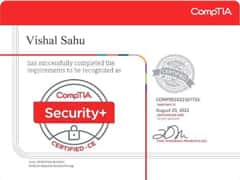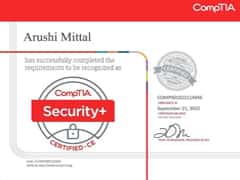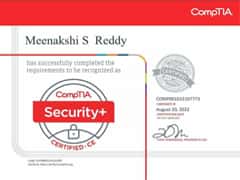Learn End Point Security Training Course in Delhi
October 10, 2021 2024-05-06 17:46Learn End Point Security Training Course in Delhi
Learn End Point Security Training Course in Delhi
Bestseller
3571 Student Reviews
The endpoint is one of the most critical parts of the network to defend, particularly since network threats often affect the weakest link in a network’s security.
- Course Duration : 60 Hours
- Language : Hindi | English
- Course Delivery : Online | offline

FutureSkills Prime Partner (A MeitY NASSCOM Digital Skilling Initiative)
Accredited by NASSCOM, approved by the Government of India
Book a Trial Demo Class
Training Available 24*7 Call at +91 9513805401
End Point Security Training in Delhi
End Point Security Course in Delhi: It tracks and hunts the next-level viruses and malware in your endpoint devices from a centralized system. seamless protection that doesn’t come in your typical antiviruses and firewalls.it uses machine learning and fuzzy logic to detect that bypasses your traditional protection mechanism.
Endpoint security is the way toward getting the different endpoints security on an organization, regularly characterized as end-client gadgets like cell phones, workstations, and work area PCs, in spite of the fact that equipment, for example, workers in a server farm are additionally viewed as endpoints security. Exact definitions fluctuate among thought pioneers in the security space, however basically, endpoint security tends to the dangers introduced by gadgets associating with a venture organization.
Endpoint Security Course Content
Endpoint security can be termed as the prime exercise of safeguarding the entry points or endpoints of end-user IoT devices such as desktops, laptops, and smartphone devices from getting compromised by malicious actors and entities. Generally, Endpoint security systems secure these endpoints on a preferred network or in the cloud server from cybersecurity threats as better as cyberattacks.
There are as many as 11 types of Endpoint Security procedures by which one can engage one’s end-user IoT devices to safeguard against malicious actors, campaigns, and entities. Some of the dedicated types of Endpoint Security categories are given below:
• Internet of Things (IoT) Security.
• Antivirus Solutions.
• Endpoint Detection and Response.
• URL Filtering.
• Application Control.
• Network Access Control.
• Browser Isolation.
• Cloud Perimeter Security.
The basic difference between Endpoint Security and an Antivirus system is that End Point Security Software safeguards all the networks endpoints from several kinds of cyberattacks and threats while an antivirus software secures a personal system or devices from being compromised to a sudden cyberattack or malicious campaigns.
There are considerable dedicated methods by which a working professional can sincerely secure the endpoints such as the following algorithm devotedly recommended to safeguard the entry and endpoints of an end-user IoT device:
1. Do the Fundamentals Well. …
2. Know Your Endpoints. …
3. Deploy Advanced and Automated Endpoint Protection. …
4. Prioritize and Automate Detection and Response. …
5. Make Employees Your Ally.
There are many Endpoint Protection services duly available in the market nowadays. However, I will recommend you to try the following solutions:
• Bit Defender GravityZone Advanced Business Security Antivirus solution which is free of cost in its beta version whereas once you download it into your system, it will ask you to take the premium version which is skipable.
• Avast Business Antivirus Solution.
• ESET PROTECT. A well-rounded endpoint security solution.
• Panda WatchGuard Endpoint Security.
Endpoints in Cloud can be described as a dedicated API Management system that assist an end-user to safeguard, create, control, analyze, and manage quotas on your APIs. The Endpoints dedicatedly utilizes the ESPs (Extensible Service Proxy) or Extensible Service Proxy V2 Beta (ESPv2 Beta) to host your APIs.
The Endpoint Security Tools are some types of devoted software nicely dedicated to detecting, observing, and controlling the myriad of endpoint devices such as desktops, laptops, tablets, and smartphones used by an organization. For instance, Crowdstrike Falcon, F-Secure Rapid Detection & Response, Palo Alto Networks Cortex XDR, Trend Micro Apex One, etc.
- Step One: Triage and Prioritize Resources. Regularly run vulnerability scans of known assets for weaknesses and vulnerabilities, cross-referencing against asset lists. …
- Step Two: Automate. Automation is the key to maximizing resources. …
- Step Three: Have (and Practice) Your Plan. …
- Step Four: Learn From Your Incidents.
Endpoint Security Our Course Advisor
End point Security is Increasingly Important
Any device, such as a smartphone, tablet, or laptop, provides an entry point for threats. Endpoint security aims to decently secure every endpoint connecting to a network to block the access attempts and other risky activity at these points of entry. As more organizations adopt practices such as BYOD (Bring Your Own Device) and remote/mobile employees, the enterprise network security perimeter has basically dissolved.
Course Highlights
- Implementing Internet Security Anti Virus.
- Mobile Device Management For Industry
- Security Information and Event Management
- Two-Factor Authentication Implementation
- Data Loss Prevention Overview & Implementation
- Unified Threat Management
- Next-Generation Firewall
- ISO 27001 Lead Auditor Guidelines
Choose Your Preferred Learning Mode

Classroom Training
We offer customized VILT (Virtual Instructor-Led Training) sessions at your convenient hours to provide effortless training.

Online Training Class

Corporate Training
Hire a preferred trainer at your work premises at your chosen time slots and train your employees with full efficiency.
Endpoint Security Course Description
Home and business gadgets – like cell phones, tablets, workstations and work areas – are helpless against various dangers from cybercriminals. While the client may empower a danger entertainer admittance to their gadget by succumbing to a phishing assault or opening a dubious connection, having an endpoint security arrangement can keep malware from spreading through the machine.
The benefits of end point security include:
Protection for devices – Including, besides traditional malware like ransomware and Trojans, file-based and file less script attacks and malicious JavaScript, VBScript, PowerShell and other macros. Cost savings – By obstructing the necessary remediation of malware-ridden devices, protecting trade secrets and other intellectual property, aiding device performance and preventing ransomware attacks. Time savings – By freeing up IT staff or managed service providers to focus on main business objectives, ensuring uptime for all devices, and streamlining the management and prevention of online threats. Compliance satisfaction – Many organizations are governed by data security regulations which is required special precautions against the theft or private personal data, like retail, healthcare and the public sector to name just a few.
Craw Security's Students Awarded











Related Cyber Security Course
What People Are Saying About Craw Security
Google Review (1,156) ★★★★★






Endpoint Security Frequently Asked Questions
Endpoint security is the practice of securing endpoints or entry points of end-user devices such as desktops, laptops, and mobile devices from being exploited by malicious actors and campaigns. Endpoint security systems protect these endpoints on a network or in the cloud from cybersecurity threats.
- Internet of Things (IoT) Security. …
- Antivirus Solutions. …
- Endpoint Detection and Response. …
- URL Filtering. …
- Application Control. …
- Network Access Control. …
- Browser Isolation. …
- Cloud Perimeter Security.
- 1) Do the Fundamentals Well. …
- 2) Know Your Endpoints. …
- 3) Deploy Advanced and Automated Endpoint Protection. …
- 4) Prioritize and Automate Detection and Response. …
- 5) Make Employees Your Ally.
- ESET PROTECT. A well-rounded endpoint security solution. …
- Trend Micro Worry-Free Services Suites. A good endpoint security solution. …
- Bitdefender GravityZone Advanced Business Security. Market leading detection rates at a bargain price. …
- Panda WatchGuard Endpoint Security.
Endpoint security is the process of protecting devices like desktops, laptops, mobile phones, and tablets from cyberattacks. Endpoint security software enables businesses to protect devices that employees use for work purposes either on a network or in the cloud from cyber threats.
Endpoints is a distributed API management system. It provides an API console, hosting, logging, monitoring, and other features to help you create, share, maintain, and secure your APIs. This page provides an overview of Cloud Endpoints for OpenAPI.
Endpoint security is the practice of securing endpoints or entry points of end-user devices such as desktops, laptops, and mobile devices from being exploited by malicious actors and campaigns. Endpoint security systems protect these endpoints on a network or in the cloud from cybersecurity threats.
- Step One: Triage and Prioritize Resources. Regularly run vulnerability scans of known assets for weaknesses and vulnerabilities, cross-referencing against asset lists. …
- Step Two: Automate. Automation is the key to maximizing resources. …
- Step Three: Have (and Practice) Your Plan. …
- Step Four: Learn From Your Incidents.








